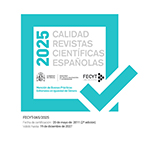Conspiracy as a Political Weapon. The Seditious Plan of August 14, 1833 in Cartagena
Abstract
This article examines the issue of conspiracy in the first half of the nineteenth century in what is now Colombia. In particular, it focuses on the analysis of court records pertaining to the lawsuit against the over fifty persons involved –mostly artisans– in the conspiracy of August 14, 1833 in the city of Cartagena. Although the judicial process highlighted racial motivations, the festive nature of the event, the political affiliation of the defendants and their socio-professional needs inserted the conspiracies within the framework of a factional political struggle, in which the invention or magnification of the conspiracies, based on references shared by the community, were as important as the seditious actions themselves.Downloads
Article download
License
In order to support the global exchange of knowledge, the journal Revista Complutense de Historia de América is allowing unrestricted access to its content as from its publication in this electronic edition, and as such it is an open-access journal. The originals published in this journal are the property of the Complutense University of Madrid and any reproduction thereof in full or in part must cite the source. All content is distributed under a Creative Commons Attribution 4.0 use and distribution licence (CC BY 4.0). This circumstance must be expressly stated in these terms where necessary. You can view the summary and the complete legal text of the licence.











